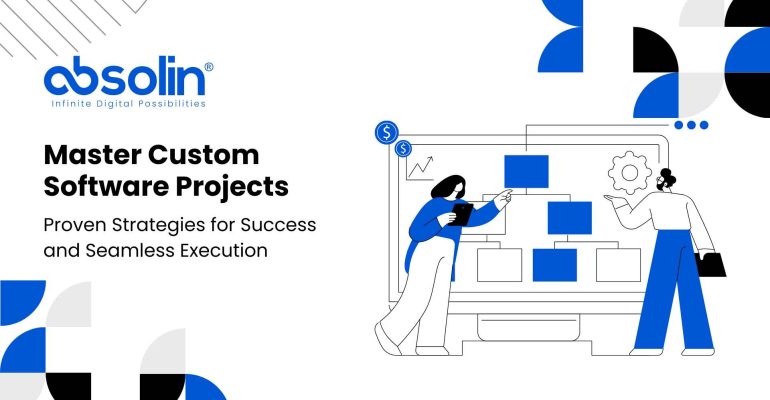How to Successfully Manage a Custom Software Project

How to Successfully Manage a Custom Software Project
Managing a custom software project can be a complex and challenging endeavour, requiring a combination of technical expertise, strategic planning, and effective communication. Unlike off-the-shelf solutions, custom software projects are tailored to meet the unique needs of an organization, which adds layers of complexity to the development process. Whether you’re a project manager, business owner, or developer, understanding how to successfully manage a custom software project is key to ensuring its success. Here’s a guide to help you navigate the journey from concept to completion.
1. Define Clear Objectives and Requirements
The foundation of any successful custom software project is a clear understanding of what you want to achieve. Start by defining the project’s objectives and requirements in detail. This involves collaborating with stakeholders to gather their input and ensuring that everyone has a shared vision of the final product.
Key questions to ask during this phase include:
- What problem is the software solving?
- Who will be the primary users?
- What features and functionalities are essential?
- What are the project’s success criteria?
Documenting these requirements in a comprehensive project plan will serve as a roadmap, guiding the development team and helping to avoid scope creep later in the project.
2. Assemble the Right Team
A successful custom software project relies heavily on the skills and expertise of the development team. Assemble a team that includes not only developers but also business analysts, UX/UI designers, quality assurance testers, and project managers. Each member should have a clear understanding of their role and responsibilities.
Communication and collaboration within the team are crucial. Regular meetings, clear communication channels, and a collaborative work environment will help keep everyone aligned and focused on the project’s goals.
3. Adopt an Agile Methodology
Agile methodologies are particularly well-suited to custom software projects because they allow for flexibility and iterative development. Instead of trying to deliver the entire project in one go, Agile breaks the project down into smaller, manageable sprints. Each sprint focuses on delivering a specific set of features or improvements, which are then reviewed and refined based on feedback.
This iterative approach allows for continuous improvement, early detection of potential issues, and the ability to adapt to changing requirements. It also helps ensure that the final product aligns closely with the stakeholders’ expectations.
4. Prioritize User Experience (UX) Design
User experience (UX) design is a critical aspect of custom software development. Even the most powerful software will fail if users find it difficult to use or if it doesn’t meet their needs. Invest time in understanding the end users, their workflows, and pain points.
Work closely with UX/UI designers to create intuitive, user-friendly interfaces that enhance the overall experience. Prototyping and user testing are valuable practices that can help identify potential usability issues early in the design phase, saving time and resources in the long run.
5. Implement Robust Project Management Practices
Effective project management is essential to keep a custom software project on track. Use project management tools to plan, track, and manage tasks, deadlines, and resources. Establish a project timeline with clear milestones and deliverables, and regularly monitor progress against these benchmarks.
Risk management should also be a key focus. Identify potential risks early in the project and develop contingency plans to address them. Regular risk assessments throughout the project will help you stay ahead of any challenges that may arise.
6. Maintain Open Communication with Stakeholders
Transparent and continuous communication with stakeholders is vital for the success of a custom software project. Keep stakeholders informed about the project’s progress, challenges, and any changes in scope or timeline. Regular status updates, meetings, and demos can help build trust and ensure that stakeholders remain engaged throughout the development process.
Stakeholders should also be encouraged to provide feedback during key stages of the project. This feedback is invaluable for making adjustments and ensuring that the final product meets their expectations.
7. Focus on Quality Assurance and Testing
Testing is a critical component of custom software development, and it should be integrated into every phase of the project. Implement a comprehensive quality assurance (QA) strategy that includes unit testing, integration testing, and user acceptance testing (UAT).
Testing should not be an afterthought; instead, it should be conducted continuously throughout the development process to catch and fix bugs early. Automated testing tools can also help streamline the QA process and improve the reliability of the software.
8. Prepare for Deployment and Post-Launch Support
Successful deployment requires careful planning and coordination. Ensure that all stakeholders are prepared for the transition, and that any necessary training is provided to users. A smooth deployment process is crucial for minimizing disruptions to the business.
Post-launch support is equally important. Plan for ongoing maintenance, updates, and user support to address any issues that may arise after the software is live. Establish a feedback loop with users to gather insights for future improvements and iterations.
Conclusion
Managing a custom software project requires a strategic approach that balances technical execution with effective communication and collaboration. By defining clear objectives, assembling the right team, adopting Agile methodologies, and focusing on user experience, you can navigate the complexities of custom software development and deliver a successful project. With robust project management practices, continuous testing, and a commitment to post-launch support, your custom software project can achieve its full potential, driving value and innovation for your organization.





